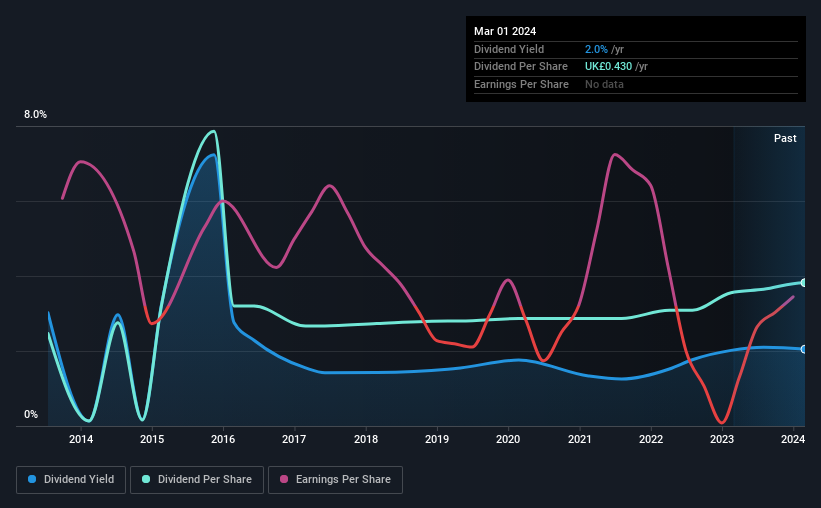Don't Buy Rights and Issues Investment Trust Public Limited Company (LON:RIII) For Its Next Dividend Without Doing These Checks
Readers hoping to buy Rights and Issues Investment Trust Public Limited Company (LON:RIII) for its dividend will need to make their move shortly, as the stock is about to trade ex-dividend. The ex-dividend date is one business day before the record date, which is the cut-off date for shareholders to be present on the company's books to be eligible for a dividend payment. The ex-dividend date is important as the process of settlement involves two full business days. So if you miss that date, you would not show up on the company's books on the record date. Thus, you can purchase Rights and Issues Investment Trust's shares before the 7th of March in order to receive the dividend, which the company will pay on the 5th of April.
The company's next dividend payment will be UK£0.3125 per share, on the back of last year when the company paid a total of UK£0.43 to shareholders. Looking at the last 12 months of distributions, Rights and Issues Investment Trust has a trailing yield of approximately 2.0% on its current stock price of UK£21.00. Dividends are a major contributor to investment returns for long term holders, but only if the dividend continues to be paid. That's why we should always check whether the dividend payments appear sustainable, and if the company is growing.
See our latest analysis for Rights and Issues Investment Trust
If a company pays out more in dividends than it earned, then the dividend might become unsustainable - hardly an ideal situation. Rights and Issues Investment Trust paid out more than half (70%) of its earnings last year, which is a regular payout ratio for most companies.
When a company paid out less in dividends than it earned in profit, this generally suggests its dividend is affordable. The lower the % of its profit that it pays out, the greater the margin of safety for the dividend if the business enters a downturn.
Have Earnings And Dividends Been Growing?
Companies with falling earnings are riskier for dividend shareholders. If earnings decline and the company is forced to cut its dividend, investors could watch the value of their investment go up in smoke. That's why it's not ideal to see Rights and Issues Investment Trust's earnings per share have been shrinking at 2.1% a year over the previous five years.
Many investors will assess a company's dividend performance by evaluating how much the dividend payments have changed over time. Since the start of our data, 10 years ago, Rights and Issues Investment Trust has lifted its dividend by approximately 4.5% a year on average. Growing the dividend payout ratio while earnings are declining can deliver nice returns for a while, but it's always worth checking for when the company can't increase the payout ratio any more - because then the music stops.
To Sum It Up
Has Rights and Issues Investment Trust got what it takes to maintain its dividend payments? Earnings per share have been declining and the company is paying out more than half its profits to shareholders; not an enticing combination. These characteristics don't generally lead to outstanding dividend performance, and investors may not be happy with the results of owning this stock for its dividend.
Curious about whether Rights and Issues Investment Trust has been able to consistently generate growth? Here's a chart of its historical revenue and earnings growth.
A common investing mistake is buying the first interesting stock you see. Here you can find a full list of high-yield dividend stocks.
Have feedback on this article? Concerned about the content? Get in touch with us directly. Alternatively, email editorial-team (at) simplywallst.com.
This article by Simply Wall St is general in nature. We provide commentary based on historical data and analyst forecasts only using an unbiased methodology and our articles are not intended to be financial advice. It does not constitute a recommendation to buy or sell any stock, and does not take account of your objectives, or your financial situation. We aim to bring you long-term focused analysis driven by fundamental data. Note that our analysis may not factor in the latest price-sensitive company announcements or qualitative material. Simply Wall St has no position in any stocks mentioned.

 Yahoo Finance
Yahoo Finance 
